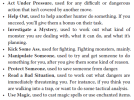Doc Sammy
White Trash Weeb
- Joined
- Apr 25, 2017
- Messages
- 1,926
- Reaction score
- 2,644
I don't like PtbA either.
Only pansies, hipsters, and sailors like Powered by the Apocalypse.
But then again, I am a huge fan of Big Eyes Small Mouth and the only people who like BESM are steers and queers. And I don't see no horns on me when I look in the mirror. Or in any of my Pub avatars...


Wait a minute...
*looks at current avatar, then looks at past avatars, then looks at my internet browser history and all those texts from my previous boyfriends*
I did not know that about myself.
Only pansies, hipsters, and sailors like Powered by the Apocalypse.
But then again, I am a huge fan of Big Eyes Small Mouth and the only people who like BESM are steers and queers. And I don't see no horns on me when I look in the mirror. Or in any of my Pub avatars...


Wait a minute...
*looks at current avatar, then looks at past avatars, then looks at my internet browser history and all those texts from my previous boyfriends*
I did not know that about myself.









 .
. .
. .
.